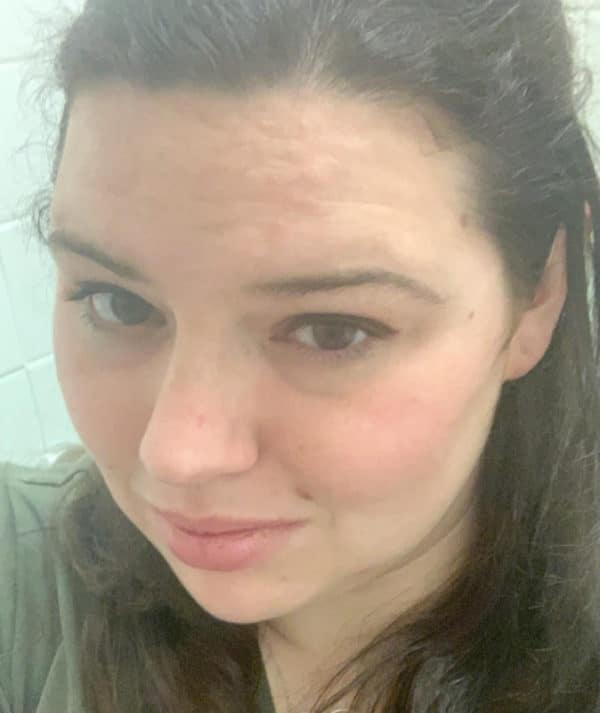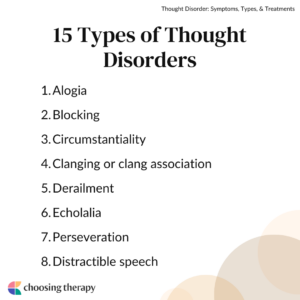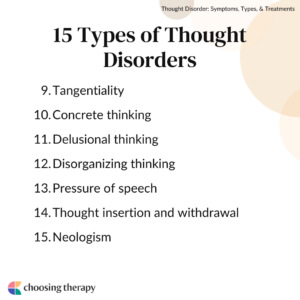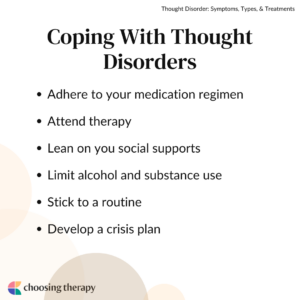Thought disorders affect communication and thinking patterns.1 The types of thought disorders produce different symptoms depending on underlying triggers or associated mental health conditions. Disorganized, loosely associated, and circumstantial thoughts are common examples. Many individuals can receive symptom relief through therapy and medications that target the root cause.
Would you like to try therapy? BetterHelp has over 20,000 licensed therapists who provide convenient and affordable online therapy. BetterHelp starts at $65 per week. Take a Free Online Assessment and get matched with the right therapist for you.
What Is a Thought Disorder?
Thought disorders are significantly abnormal cognitive disturbances that impact thought processes, language, and communication abilities.1,3 Thinking disorders are primarily expressed or observed through speech, making communication difficult.
Examples of thought disorders include quickly switching from one topic to another, providing minimally or unrelated answers to questions, and responding with a mix of words or “word salad.” Thought disorders can occur in schizophrenia, mood disorders, manic episodes, and other psychotic disorders. Lastly, thought disorders can also stem from physical and neurological issues like dementia.1,3,4,5
Thought Disorder Symptoms
Symptoms and signs of a thought disorder can seriously impair the ability to communicate, whether through writing or speaking. Manifestations can appear and affect each individual differently, making diagnosis highly individualized.
Potential thought disorder symptoms could include:2,4
- Difficulty focusing or being easily distracted
- Rambling, disconnected speech (incoherence)
- Disconnected or loose association thought processes
- Switching topics quickly and unclearly, also called “loose associations”
- Noticeable changes in movement
- Fluctuations in energy levels
- Isolation from others
- Auditory or visual hallucinations
- Delusions or grandiose delusional thoughts (e.g., “I’m the President.”)
- Paranoia or persecutory delusions (e.g., “Someone is out to get me.”)
- Limited insight and judgment
- Flatness in tone, voice, or facial expressions
- Poor eye contact or staring off without focus
- Rapid speech and thought process, even to the point of slurring speech
- Mood lability, whether depressed or euphoric mood
- Heightened irritability
- Unsafe or reckless behavior
- Increased use of substance use
Top Rated Online Therapy Services Online-Therapy.com – Great Alternative In addition to therapy, all Online-Therapy subscriptions include a self-guided CBT course. Visit Online-Therapy.com Online-Therapy.com – Great Alternative In addition to therapy, all Online-Therapy subscriptions include a self-guided CBT course. Visit Online-Therapy.com
15 Types of Thought Disorders
Thought disorders can affect the organization, patterns, or content of thoughts. For example, individuals may repeat words or sound distracted when speaking. Thought disorders affect speech differently, but individuals will exhibit significant communication challenges.
Below are 15 types of thought disorders:
1. Alogia
Alogia (poverty of thought) occurs when an individual has difficulty speaking in general. They may struggle with verbal fluency, which is the ability to recall memories and express that information.1,6
2. Blocking
Blocking relates to difficulties in fully expressing or completing thoughts. Thought blocking may manifest as frequent pauses in speech or significant delays in completing thoughts. Sometimes, individuals may simply stop speaking.5
3. Circumstantiality
Circumstantiality is when an individual speaks in a circular, “roundabout” manner. They might fall into tangents about unrelated topics before eventually returning to the focus of their statement or the proposed question.5 Circumstantial thought processes can be challenging for outsiders to understand and follow.
4. Clanging or Clang Association
Clanging thought processes are when an individual speaks in similar sounding words rather than context-related statements. Instead of a straightforward thought, the person might use a jumble of words that rhyme, alliterations, or puns.1
5. Derailment
Derailment affects the ability to maintain a thought. An individual may interrupt thoughts and move to other indirectly related ones. Outsiders can observe derailed thought processes in both speech and writing. Derailment is frequently called “loose associations.”1
6. Echolalia
Echolalia is when a person repeats or echoes words, sounds, or phrases. Echolalia can occur immediately after hearing a particular thing, or individuals may repeat these sounds sporadically and frequently. Autistic people often engage in echolalia, and many may use phrases from a movie or TV show.7
7. Perseveration
Perseveration is the rumination or repetition of a thought. People may feel “stuck” in a specific thought pattern, and shifting focus can seem challenging, even impossible.
8. Distractible Speech
A person with distractible speech loses their train of thought. They may become distracted by another thought or external distraction, even in the middle of a sentence. Individuals experience confused thoughts that jump from topic to topic, and those listening may struggle to comprehend their story or conversation.
9. Tangentiality
A person with tangential thoughts may stray to an unrelated or loosely related topic. Tangentiality resembles losing trains of thought mid-sentence, and these digressions can result in incoherent thought processes. The person may never return to their original discussion, leaving others confused.
10. Concrete Thinking
Concrete thinking refers to a person becoming focused on facts and figures. They may misunderstand abstract communication styles like hypothetical examples, sarcasm, or metaphors. Their language is very literal, direct, and straightforward.
11. Delusional Thinking
Delusional thoughts are not rigid and persistent ideas not based on reality or accuracy. These thought disturbances can include persecutory, paranoid, or grandiose delusions.
12. Disorganizing Thinking
Disorganized thinking is when thought processes are irrational, unorderly, or illogical. Individuals with disorganized thought processes may find communicating difficult, and others may misunderstand their disordered thinking.
13. Pressure of Speech
Pressure of speech is a rapid, pressured, and continuous speech pattern. This thought disorder can happen during manic or psychotic episodes. Others may struggle to follow these fast and shifting dialogues.
14. Thought Insertion & Withdrawal
Thought insertion is when an individual believes an outside source implants thoughts inside their head. Similarly, those experiencing thought withdrawal think someone or something has access to their internal thoughts.
15. Neologism
A neologism is a new word, thought, or expression one creates. Neologism in dementia is common, and individuals with this condition often use new words or phrases in place of common ones.8
Would you like to try therapy? BetterHelp has over 20,000 licensed therapists who provide convenient and affordable online therapy. BetterHelp starts at $65 per week. Take a Free Online Assessment and get matched with the right therapist for you.
Causes of Thought Disorder
Various mental health conditions can cause thought disorders, including depression, anxiety, and psychotic disorders. In some cases, neurological conditions like Alzheimer’s can erode mental capacities associated with memory and thinking, possibly contributing to a formal thought disorder.
Possible risk factors for thought disorders include:
- Anxiety disorders
- Depression
- Bipolar disorder
- Traumatic brain injuries
- Schizophrenia
- Psychotic disorders
- Chronic stress
- Dementia
- Alzheimer’s
- Developmental disorders
How Are Thought Disorders Diagnosed?
Several assessment tools are available to assist in diagnosing thought disorders. Clinicians often identify thought disorders as symptoms of another disorder rather than an individual diagnosis. Assessment tools can help providers identify different thought disorders commonly found in schizophrenia, bipolar disorder, dementia, and other conditions.
Below are possible tests used to diagnose thought disorders:
- Rorschach test: Clinicians may use the Rorschach test to assess an individual for thought disorders. Testers ask individuals to describe a series of inkblots, and their answers may provide insight into the underlying causes of their symptoms.9
- Thought Disorders Index (TDI): The TDI is a rating scale with 23 categories clinicians may administer after the Rorschach test.
- Thought, Language, and Communication Scale (TLC): The TLC includes interviews that can help assess for thought disorder symptoms.10
Treatment of Thought Disorders
Effective treatment for thought disorder primarily includes talk therapy and medication. While therapy can seem daunting, especially for those struggling with communication, help is available when individuals are ready.
Therapy
Effective therapies for thought disorders and underlying conditions often include behavioral approaches and sometimes family therapy (if applicable or necessary). Therapy is beneficial as a stand-alone treatment, but a combination of therapy and psychiatric medication is often best for those experiencing mental health disorders like schizophrenia or bipolar.
Therapies for thought disorders may include:
- Cognitive behavioral therapy (CBT): CBT aims to help individuals challenge and confront disordered thinking by testing thoughts against reality and replacing them with more realistic, healthy alternatives.
- Acceptance and commitment therapy (ACT): Unlike CBT, ACT does not seek to challenge or remove negative thoughts. Instead, individuals simply notice and accept these thoughts without allowing them to influence behavior.
- Family therapy: Family therapy can provide a person with support as their whole family increases coping skills and improves communication.
- Social skills training: A person with a thought disorder likely struggles with social interactions. Social skills training can teach them to communicate more effectively, build interpersonal skills, and improve relationships.
Medication
Medication can help reduce communication disruptions and stabilize thought disorder symptoms.2 Antipsychotics (first and second generation) are common when treating thought disorders and associated conditions. Professionals will recommend and tailor medication plans to address underlying concerns and affecting functionalities.2
Coping With Thought Disorders
Living with a thought disorder can be difficult, isolating, frustrating, and even terrifying. However, you can take healthy steps toward coping with your symptoms. Living a meaningful and fulfilling life is within reach–consider reaching out for additional support and guidance.
Below are healthy ways to cope with thought disorder symptoms:
- Adhere to your medication regimen: Medication is often the primary treatment for thought disorders. Always take your medications as prescribed and communicate with your provider if any issues arise.
- Attend therapy: Many therapies are available to help you improve disordered thinking and build healthy coping skills.
- Social supports: Explore available resources, such as mental health care, social services, support groups, and case management. Local community organizations or facilities may offer these at little to no cost.
- Limit the use of alcohol and other substances: Substance use can worsen thought disorders and interfere with medications. Reduce or abstain from mood-altering substances to allow for the best treatment results.
- Stick to a routine: A healthy daily routine, including good sleep hygiene, self-care, and nutritious food, can help individuals lower stress, reduce symptoms, and regain a sense of control in their lives.
- Develop a crisis plan: Develop a plan with a mental health professional in case symptoms worsen and you cannot communicate your needs. For example, a WRAP plan includes directives for mental health care, treatments, and emergency contact information.
In My Experience
To help our readers take the next step in their mental health journey, Choosing Therapy has partnered with leaders in mental health and wellness. Choosing Therapy is compensated for marketing by the companies included below Talk Therapy Online-Therapy.com – Get support and guidance from a licensed therapist. Online-Therapy.com provides 45 minute weekly video sessions and unlimited text messaging with your therapist for only $64/week. Get started Psychiatry, with you in mind Talkiatry – Our Psychiatrists Can Diagnose Your Condition, Prescribe Medication, And Monitor Your Progress. Most psychiatry visits cost patients $30 or less* Free Assessment Starting Therapy Newsletter A free newsletter for those interested in learning about therapy and how to get the most benefits out of therapy. Get helpful tips and the latest information. Sign Up DBT Skills Course Jones Mindful Living Dialectical Behavior Therapy (DBT) is a popular treatment for BPD. Learn DBT skills with live weekly classes and online video courses for only $19 per month. Free One Week Trial Choosing Therapy Directory You can search for therapists by specialty, experience, insurance, or price, and location. Find a therapist today. *Includes copayment, deductible, coinsurance, and $0 Visits. Excludes no shows.Additional Resources
Online Anxiety Test A few questions from Talkiatry can help you understand your symptoms and give you a recommendation for what to do next. How Does ERP Help With Intrusive Thoughts? Obsessive compulsive disorder (OCD) is a psychiatric condition marked by the presence of obsessive thoughts, images, doubts, or urges, followed by compulsive behaviors or acts aimed at easing the distress caused by the obsession. While the content of the obsessions can take many forms, they are always repetitive, persistent, involuntary, and intrusive, and they often result in a great deal of anxiety for the person experiencing them.











